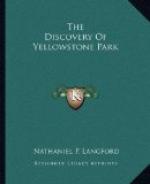Mr. Charles T. Whitmell, of Cardiff, Wales, a distinguished scholar and astronomer, who has done much to bring to the notice of our English brothers the wonders of the Park—which he visited in 1883—in a lecture delivered before the Cardiff Naturalists’ Society on Nov. 12, 1885, sought to impress upon the minds of his audience the full significance of the above characterization. He said: “This quite unique description means a great deal, I can assure you; for Western American lying is not to be measured by any of our puny European standards of untruthfulness.”
But the writings of Wheeler and others, running through a long series of years and covering an extended range of new discoveries, have vindicated the truthfulness of the early explorers, and even the stories of Bridger are not now regarded as exaggerations, and we no longer write for his epitaph,
Here lies Bridger.
As I recall the events of this exploration, made thirty-five years ago, it is a pleasure to bear testimony that there was never a more unselfish or generous company of men associated for such an expedition; and, notwithstanding the importance of our discoveries, in the honor of which each desired to have his just share, there was absolutely neither jealousy nor ungenerous rivalry, and the various magazine and newspaper articles first published clearly show how the members of our party were “In honor preferring one another.”




